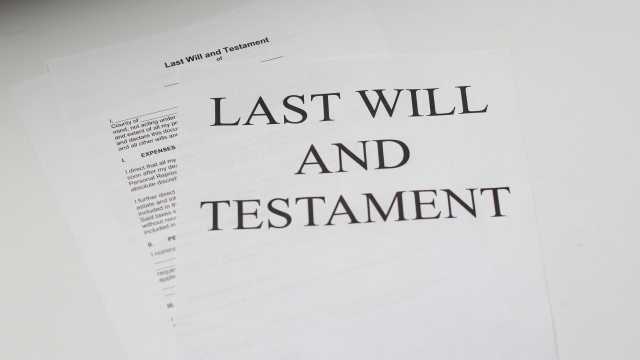Estate Planning
Creating a will or trust ensures that your estate is bequeathed in the way you wish, and can also state your desires regarding medical decisions and procedures should you become incapable of taking care of yourself. But, what's the difference?

C.E Larusso
•
Published March 8th, 2022
•
Updated July 21st, 2022
Table of Contents
Key Takeaways
Wills and trusts both help ensure your assets are distributed upon your death.
A trust is a great way to skip probate, but you’ll need to set it up before death and make sure your beneficiaries are solid.
A will and a trust each have individual benefits, and some will need to have both in place to fully protect their survivors.
Whether we want to or not, inevitably thoughts turn to what will happen to our family, friends, and things after our death. While some of this is out of our control, the task of distributing assets to named beneficiaries can be handled in our lifetimes.
Creating a will or trust ensures that your estate is bequeathed in the way you wish, and can also state your desires regarding medical decisions and procedures should you become incapable of taking care of yourself. But, what's the difference?
What Is a Will?
A will, or last will and testament, is a legal document—usually crafted with help from your attorney or online service—that dictates how you want your assets (including your house, car, and other physical assets) to be distributed after your death.
Your will can also include instructions for various post-mortem arrangements, such as your funeral, guardian appointment for any children or pets, or assignment of will executor.
Any assets that are held in a single name can be in your will; things jointly-owned, such as “joint tenancy with rights of survivorship,” or JTWROS, will go to the surviving co-owner after you pass.
Every state has its own unique rules around wills. Most require that a will be signed by the testator as well as two witnesses for it to become legally binding. Wills often go through a probate process, while trusts do not.
Types of Wills
There are four main types of wills. It’s important to know the differences between them so you can choose one best for your personal situation.
Simple Will
A simple will is exactly what it sounds like—simple. You list your assets and name the beneficiaries, and assign any caretakers for your children and pets. You can create a will with the help of your attorney or by using an online service, though most online services will keep the format as basic as possible; if you have a complicated estate, it’s best to talk to a lawyer.
Testamentary Trust Will
This kind of will puts your assets into a trust and names a trustee to manage the trust. These are often used when someone has beneficiaries who are minors or someone incapable of handling the estate on their own. You can place conditions on the inheritance; for instance, your children could receive a portion of the assets immediately and the rest when they turn 18.
Joint or Mirror Will
Joint wills are signed by two people, though the wills are separate for each testator. These are usually drafted in order for one spouse to name another spouse their full beneficiary. Joint wills cannot be changed, even after one signer dies.
Living Will
A living will dictates your preferences when it comes to medical care and treatments, should you ever be incapable of making these decisions on your own. It does not cover the distribution of any of your assets.
You can also use a living will to name someone to make medical decisions on your behalf, such as your spouse or your child. In some states, an advanced healthcare directive is both a living will and a healthcare power of attorney—make sure to research your state’s laws.
What is a Trust?
A trust, unlike, a will, is set up and managed while you are still alive by a trustee, named by you. The trustee manages the distribution of the assets names in the trust according to the terms set out in the trust. You may be the trustee of your own trust, though you should name a successor trustee in the case of your death or if you become incapacitated.
Types of Trusts
As with wills, there are many kinds of trusts to choose from.
Revocable Trust
With a revocable trust, you can alter, amend, or terminate the trust during your lifetime; after your death, a revocable trust becomes irrevocable. Anything in the trust at the time of death can pass outside of probate, but the assets are included in the grantor’s taxable estate.
Irrevocable Trust
An irrevocable trust removes your ownership rights to your assets and passes them onto the trust, with a trustee overseeing the trust. As the grantor of an irrevocable trust, you cannot also be the trustee. As long as you, as the grantor, relinquish control and beneficial interest in the assets listed in the trust, any income from the assets will not be included in taxable income.
Special Purpose Trust
Your trust might need extra stipulations in it that go beyond leaving assets to your children and extended family. If you wish to use a trust to support nonprofits or charities, or need to sort out unique family situations, special needs trusts and charitable trusts exist for these purposes.
- Charitable Trusts are set up for a term, either a lifetime or one or more individuals or a specified number of years. The grantor places assets in the trust, with regular payments going to charities. When the defined term has ended, the leftover assets are distributed to other beneficiaries. These trusts can allow the grantor to take a special tax deduction and receive estate and gift tax benefits.
- Special Needs Trusts can be set up by individuals to address the financial needs of family or other loved ones. The trusts are set up in a way for the beneficiaries to receive payouts from the trust for specific purposes without risking their ability to collect from federal and state public assistance programs, such as the Supplemental Security Income.
Will vs Trust: Main Differences
Now that we’ve defined the basics of wills and trusts, let’s break down the key differences between wills and trusts.
1. The Probate Process
Wills must go through probate, which is the legal process of distributing your assets after your death. A court oversees probate to ensure your will has been followed as written. Probate court is time-consuming and often expensive, one reason why some people prefer to establish trusts, which do not need to go through probate.
2. Privacy
Probate is a public matter; the process is recorded by the courts and anyone can access the records. Trusts allow for you to keep your asset distribution private.
3. Level of Maintenance
Wills are lower maintenance, generally speaking; unless there have been major changes in your life—a divorice, for instance—plan to update yours every three to five years. Trusts should be updated every time you acquire a new asset, whether it be a car, a house, a boat, or a bank account. Trusts also typically require an attorney to set up—they’re complicated. Wills can be created by anyone for free, online, though many people prefer to get legal advice when crafting one.
4. Effective Date
Wills only go into effect after your death, while a living trust is considered an active document, providing direction over your assets during your lifetime.
5. Tax Implications
If your estate and net worth is notably significant, you might face an estate tax with either wills or living trusts. The federal estate tax exemption, in 2022, is $12.06 million (or $24.12 million for a married couple/domestic partnership). Assets above that exemption will be subject to an estate tax up to 40% (not including your state’s estate tax). If you think this might apply to you, consider an irrevocable trust, as these remove assets from your estate to lower your eventual tax burden.
Will vs Trust: Do You Need Both?
For those with simple, small estates, a will is likely enough. If you have a larger estate or wish to avoid probate, a trust might be necessary.Additionally, a will is a good supplementary document to file, because there are some things a will does that a trust cannot do, such as name guardians for your underage children or cancel debts due to you. If you have a trust to manage the majority of your estate, you will only need a very basic will that states who should inherit any property that you didn’t transfer to the trust or wish to leave in some other way.
What Is Better: A Will or a Trust?
Unfortunately, there’s no universal answer to this question. The decision revolves around your particular priorities, tax situation, family arrangements, the age(s) of your beneficiaries, and estate value. If you don’t have much to bequeath, a will is a quick and simple option, as long as you don’t mind that there will be a probate process after your death.
The reasons to establish a trust are:
- You have a large and complicated estate (over $200,000)
- You need more control over the timing of your asset distribution or wish to place stipulations on an inheritance
- You own a business
- You’d prefer to eliminate the process of probate court for your heirs
- You want your estate’s bequeathment to remain a private matter
How Much Does It Cost to Set Up a Trust?
To have an attorney set up a trust for you, expect to pay at least $1,000. You may need to pay additional fees for transferring the name on a title, deed, or registration. In addition, expect to pay an accountant to handle the taxes on the trust every year.
Other reasons setting up a trust pay cost more include:
- You have a sizeable or complicated estate
- You have many beneficiaries or need a trust fund for one or several beneficiaries
- You want to set up a charitable trust
- You seek extra advice, such as how to avoid estate taxes
Final Thoughts
Start the process of filing a will or creating a trust as soon as you can. Thinking about, and planning for, life after your death is an emotionally-wrought task, but it can save your family and friends time, energy, and confusion when they are already processing heavy emotions.
Share this advice

A professional content writer, C.E. Larusso has written about all things home, finance, family, and wellness for a variety of publications, including Angi, HomeLight, Noodle, and Mimi. She is based in Los Angeles.
Intro to Estate Planning
Wills
Trusts
Divorce Considerations For Retirement
Estate Settlement
Share this advice

A professional content writer, C.E. Larusso has written about all things home, finance, family, and wellness for a variety of publications, including Angi, HomeLight, Noodle, and Mimi. She is based in Los Angeles.
Free Retirement Consultation
Still have questions about how to properly plan for retirement? Speak with a licensed fiduciary for free.



